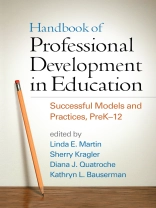This comprehensive handbook synthesizes the best current knowledge on teacher professional development (PD) and addresses practical issues in implementation. Leading authorities describe innovative practices that are being used in schools, emphasizing the value of PD that is instructive, reflective, active, collaborative, and substantive. Strategies for creating, measuring, and sustaining successful programs are presented. The book explores the relationship of PD to adult learning theory, school leadership, district and state policy, the growth of professional learning communities, and the Common Core State Standards. Each chapter concludes with thought-provoking discussion questions. The appendix provides eight illuminating case studies of PD initiatives in diverse schools.
قائمة المحتويات
Foreword, Andy Hargreaves
I. Professional Development, Past and Present
1. Teachers as Professionals: Evolving Definitions of Staff Development, Ann Lieberman & Lynne Miller
2. Federal Investments in Professional Development: What Do 50 Years of Experience Tell Us about What It Takes to Make a Difference?, Richard Long
3. High-Quality Research-Based Professional Development: An Essential for Enhancing High-Quality Teaching, Allison Swan Dagen & Rita M. Bean
II. The Complexity of Professional Development in Today’s Schools
4. Shaping the Contours of Professional Development, Pre K–12: Successful Models and Practices, D. Ray Reutzel & Sarah K. Clark
5. Changing the Relationship between Professional Development Policy and the Practitioner’s Role, Ann Jaquith
6. Communities, Schools, and Teachers, Mavis G. Sanders & Claudia Galindo
7. District Issues: Administrators at All Levels Involved In Teachers’ Professional Development, Marilyn Tallerico
8. Sociocultural Approaches to Professional Development: Supporting Sustainable School Change, Taffy E. Raphael, Jaime Madison Vasquez, Angela Joy Fortune, James R. Gavelek, & Kathryn H. Au
9. Professional Development in Early Childhood Education: Models and Recommendations, Maryann Mraz & Brian Kissel
10. The Design and Implementation of Effective Professional Development in Elementary and Early Childhood Settings, Priscilla L. Griffith, Jiening Ruan, Jennifer Stepp, & Susan J. Kimmel
11. Effective Professional Development in Secondary Schools, Douglas Fisher & Nancy Frey
III. Developing Solutions for Effective Professional Development
12. Characteristics of Adult Learning: Implications for the Design and Implementation of Professional Development Programs, Ruth L. Rohlwing & Maureen Spelman
13. Focusing Attention on Beliefs about Capability and Knowledge in Teachers’ Professional Development, Megan Tschannen-Moran & Jason A. Chen
14. Investing in Youth by Investing in Teachers: Transforming Adolescent Literacy through Responsive Professional Development, William G. Brozo
15. Involving Teachers in Their Own Professional Development, Peter Youngs & John Lane
16. Using Action Research to Target and Generate Professional Learning, Jennifer Jacobs & Diane Yendol-Hoppey
17. Leading Professional Learning in Districts with a Student Learning Culture, William A. Firestone & Melinda M. Mangin
18. Developing Partnerships through Collaboration to Promote Professional Development, Shelley B. Wepner
19. Content Knowledge for Teaching: Framing Effective Professional Development, Jennifer Merriman
20. Standards-Based Professional Learning and Certification: By the Profession, for the Profession, Lawrence Ingvarson
21. The School as a Center of Inquiry, Bruce Joyce & Emily F. Calhoun
22. Supporting Professional Growth through External Resources, Diana J. Quatroche, Kathryn L. Bauserman, & Leah Nellis
III. Pulling It Together
23. Measuring the Effectiveness of Educators’ Professional Development, Thomas R. Guskey
24. Sustaining Teacher Professional Development, Laura M. Desimone & Daniel Stuckey
25. Lessons Learned: What Our History and Research Tell Us about Teachers’ Professional Learning, Sherry Kragler, Linda E. Martin, & Ruth Sylvester
Appendix. Case Studies: Successful Schools That Have Supported Teachers’ Professional Development
عن المؤلف
Linda E. Martin, Ed D, is Professor of Elementary Education at Teachers College, Ball State University, where she serves as Director of Doctoral Programs for the Department of Elementary Education. For over two decades, she has worked with teachers across grades to develop effective literacy practices. Dr. Martin served for 7 years as a professional development liaison for Ball State, and helped to implement two large grants focused on teachers’ literacy instruction in urban schools in the Midwest.
Sherry Kragler, Ph D, is Associate Professor of Childhood Education and Literacy Studies at the University of South Florida. She was previously a classroom teacher, curriculum specialist, and Title I reading teacher/coordinator. Dr. Kragler has worked with primary-grades teachers to improve their reading instruction and has conducted professional development programs on content-area reading, comprehension instruction, portfolio assessment, and other areas.
Diana J. Quatroche, Ph D, is Professor and Chair of the Department of Elementary, Early, and Special Education in the Bayh College of Education at Indiana State University. In addition to her classroom teaching experience, she has supervised school reading programs and coordinated Title I reading programs. She served for 6 years as a professional development liaison for Indiana State University, and developed the first professional development school while a faculty member at Southeast Missouri State University.
Kathryn L. Bauserman, Ph D, is Associate Professor in the Department of Elementary, Early, and Special Education in the Bayh College of Education at Indiana State University. She has cowritten and codirected five different 2-year grant projects in Indiana that focus on graduate-level teacher professional development through workshops for teachers.












